I’ve kept Ball Pythons for over 25 years and spent large amounts of time with over 100 of them. What I can tell you is that they absolutely do sleep – even if it’s hard to tell. Though they don’t have eyelids, they are still able to sleep just like any other animal.
Intro: In this article, I’ll explain what regulates the sleep cycle of Ball Pythons both in the wild and captivity. I’ll also explain how to give your pet a sleep-friendly environment.
Understanding Ball Python Sleep
Ball Pythons are a nocturnal species of snake, which will sometimes show a little crepuscular activity too. Most of the time, I notice my snakes starting to get active around 8 to 9PM. Some of them stay awake until the early hours of the morning, and spend most of that time in ambush mode at the entrance to their favorite hideout.
In the wild they follow a similar pattern, and seem very set in their ways. In fact, snake catchers from Ghana and Togo have reported that you only ever see them during the day for two reasons: If the burrow they were hiding got flooded, or they’re incubating eggs and need a break to cool down or warm up.
According to Dyugmedzhiev et al. (2020), nocturnal activity can make functions like digestion slower because temperatures are cooler at night. It’s major benefit, however, is that it probably lowers the risks of being caught by predators.
This definitely makes sense for the Ball Python, as some of the most fierce predators in its range, like Monitor Lizards, are active during the day.
Let’s take a quick look at activity rhythms in common reptiles, to see where Ball Pythons fit in:
| Activity rhythm: | Examples: |
| Nocturnal (active at night) | Ball Python, Milk Snakes, King Snakes, some Rat Snakes |
| Crepuscular (active at dawn and dusk) | Smooth Snakes, some Rat Snakes (at least some of the time) |
| Diurnal (active during the day) | Pond Turtles, Box Turtles, Racers, Whipsnakes, Garter Snakes, Coachwhips |
| Catephemeral (active on and off all the time) | Leopard Geckos, some Water Snakes, some Vipers (depending on weather) |
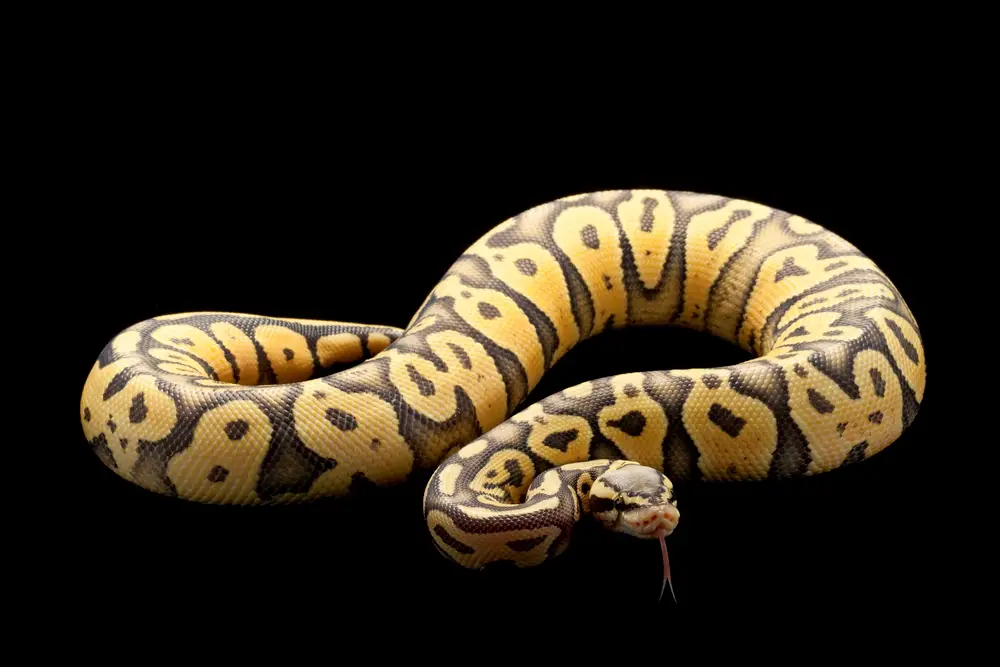
Myths about Ball Python sleep
The biggest myth surrounding Ball Python sleep is the idea that they spend 22+ hours a day sleeping. I don’t know where this information comes from, but it certainly isn’t true – most of the time.
There are circumstances where Ball Pythons will spend most of a 24 hour cycle sleeping. These are all times when they are under physiological strain, and include:
- During shedding
- After ovulation, and when building eggs
- During a dry spell in the wild, to conserve energy
- After an unusually large meal
As you might guess, these aren’t every day occurrences. From my observations, most of my Ball Pythons generally sleep around 16 hours a day, but this vary immensely. Read the next part to find out why.
Factors Affecting Ball Python Sleep
As in most animals, sleep is a regenerative tool for reptiles. It gives their bodies time to repair damage and grow. It’s also great for saving energy during times when resources are scarce.
In Ball Pythons their feeding and breeding behavior can greatly affect how much they sleep though. If a Ball Python is exceptionally hungry, then it will not sleep much until it gets a meal. And of course the opposite is also true.
When it comes to breeding, this can have a huge impact on the sleep cycle of male Ball Pythons, both in captivity and the wild. During the breeding season, some of them look for females non-stop. I have even known some of my males to go without sleep for 24hrs purely because they were so desperate to get to the ladies.
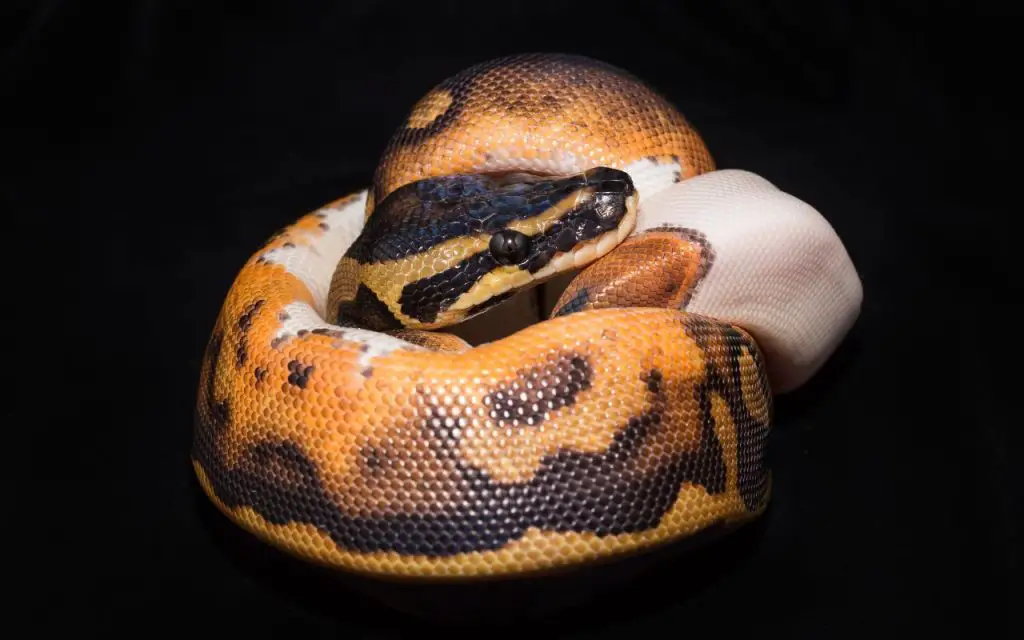
Do Ball Pythons have eyelids?
A pretty normal question to ask at this point if you aren’t particularly familiar with snakes is: Do Ball Pythons have eyelids? For us, this seems like something really important for sleep!
Like other snakes, Ball Pythons completely lack eyelids. Instead, they have a clear scale to protect their eyes that hobbyists call the “eyecap” and herpetologists often referred to call the spectacle.
Can Ball Pythons see in the dark?
Being primarily nocturnal, Ball Pythons can see very well in the dark. They actually have specific adaptations for this purpose. The first adaptation is elliptical pupils. This type of pupil looks like a cat’s eye, and is kind of like a slit down the eye.
The reason this helps with night vision is that it allows the pupil to open wider and larger than a round one, and it is the pupil that is responsible for taking in light.
The second adaptation is their heat pits. These are specialised organs in the labial scales that allow snakes to “see” heat – pretty handy for hunting rodents at night! You can read more about heat pits in the diet part of the Ball Python Care hub that is on my homepage.
Where do Ball Python sleep?
Your Ball Python will almost always sleep in its favorite hiding place. This is where it feels safe from predators. If you think your snake is regularly sleeping out in the open, try to provide it with at least one more hiding place to choose from.
In the wild, Ball Pythons prefer to sleep in the deepest, darkest burrow or hiding place available. This is the best way to avoid both predators and the midday heat. They can be found sleeping in rodent burrows, tree holes, termite mounds, and logs.
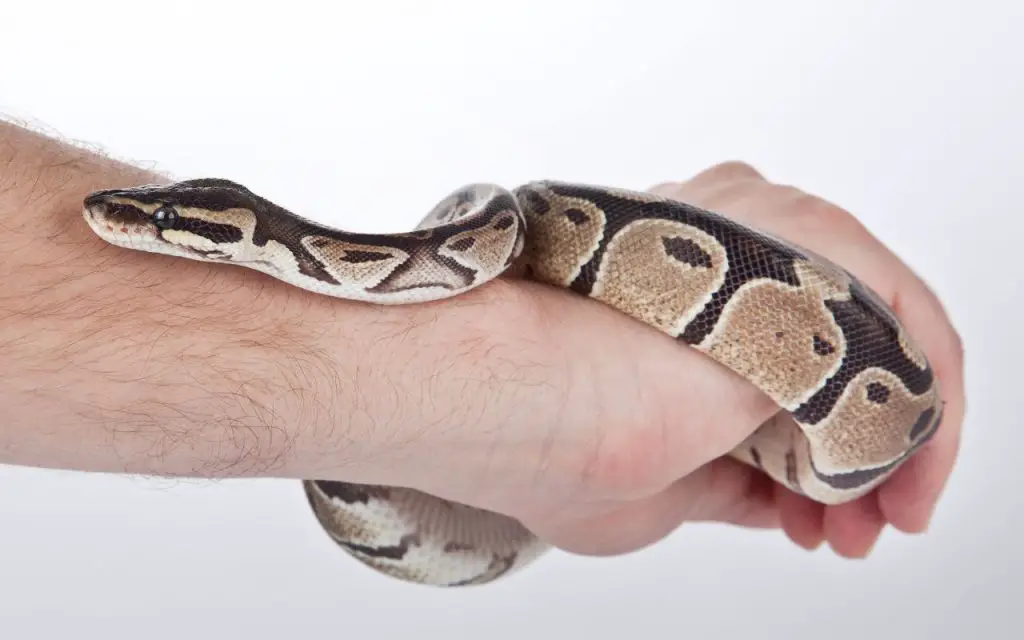
How to tell if your Ball Python is sleeping
Admittedly, it’s not easy to tell if a snake is sleeping! There are a few signs that tell you your Ball Pythons is sleeping, though:
- It’s stayed motionless for a long time
- The tongue isn’t flicking
- It’s breathing is extremely slow
- The head is tilted slightly down or resting very flat on the substrate
Often, you’ll notice that your snake does all of these things for most of the day, or until the sun goes down. Occasionally, it may be active during the day, or it may sleep for some of the night too. Both are perfectly normal.
Do Ball Pythons sleep more than other snakes?
Ball Pythons do indeed sleep more than a lot of other snakes. The main reason for this is that they are mostly ambush hunters.
Ambush hunters tend to have slow metabolisms, and relatively low levels of active. Striking prey is the most active they get, and the rest of the time they sleep or stay almost motionless to conserve energy.
Diurnal, sight-hunting snakes from temperate zones sleep much less during the summer months. If the sun comes up at 6AM and sets at 9PM, they’ll stay active the whole time – giving them only 9 hours sleep compare to the 15 or more a Ball Python might get.
Scientific Insights and Research on Ball Python sleep
At this point time, sleep in reptiles and amphibians is not a widely studied subject. There is a basic scientific understanding of it, but there’s also a lot more to learn.
Key points from the scientific community so far include:
- Sleep in reptiles is poorly understood
- They seem to be more reactive when sleeping, and are possibly less “deeply” asleep than mammals
- Snakes do not engage in REM sleep. Sadly, this means they probably don’t dream.
- Snakes do not appear to go through the same changes we do when entering sleep – but do experience a reduction in brain activity that is necessary for sleep to be beneficial
The takeaway here is that, really, most scientists agree that sleep in reptiles is poorly understood. The reptilian brain lies somewhere between that of mammals and fish in terms of complexity, but studying it more closely would be fascinating purely on the grounds of better understanding our evolutionary history.
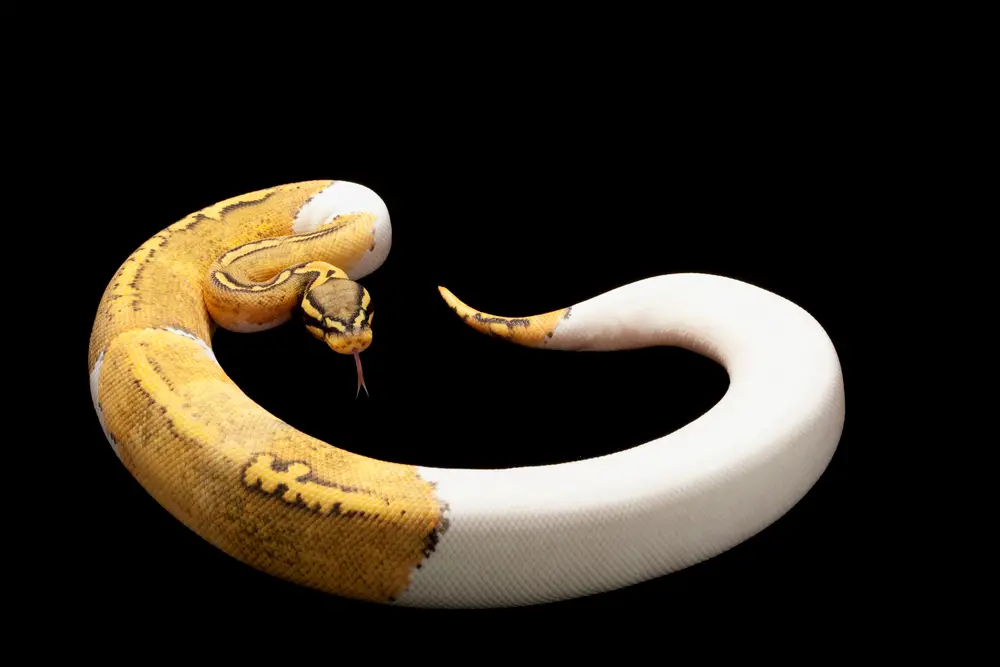
Why is my Ball Python not sleeping?
If your Ball Python is always restless and never seems to sleep, then it’s time to do some investigating. I recommend checking through the following possible reasons to figure the situation out:
- Enclosure placement. Is it in a high traffic part of the home? Or is there direct sunlight on it? Both will prevent sleep.
- Smelling other Ball Pythons. If you have a male Ball Python that can smell a lady Ball Python, he might not sleep much for most of the breeding season.
- Too warm. Being too warm stops a snake being able to rest. Double check your warm spot temperature using an infrared thermometer gun.
- Not a good enough hiding place. Nothing unsettles a Ball Python more than feeling exposed. Make sure your pet is a snug hiding place.
- Hungry. Many care sheets advise you to feed your snake too little. Try offering some food to see if that is where the problem lies.
Do Ball Pythons sleep? Conclusion
In this post, we’ve learned that Ball Pythons do indeed sleep. They also give us some subtle clues when they’re doing it, most of which are related to their body posture.
After reading, I hope you’ll now also know how much sleep is normal, and what to do if you think your pet is more restless than it should be. As always, please do get in touch with any questions, though!
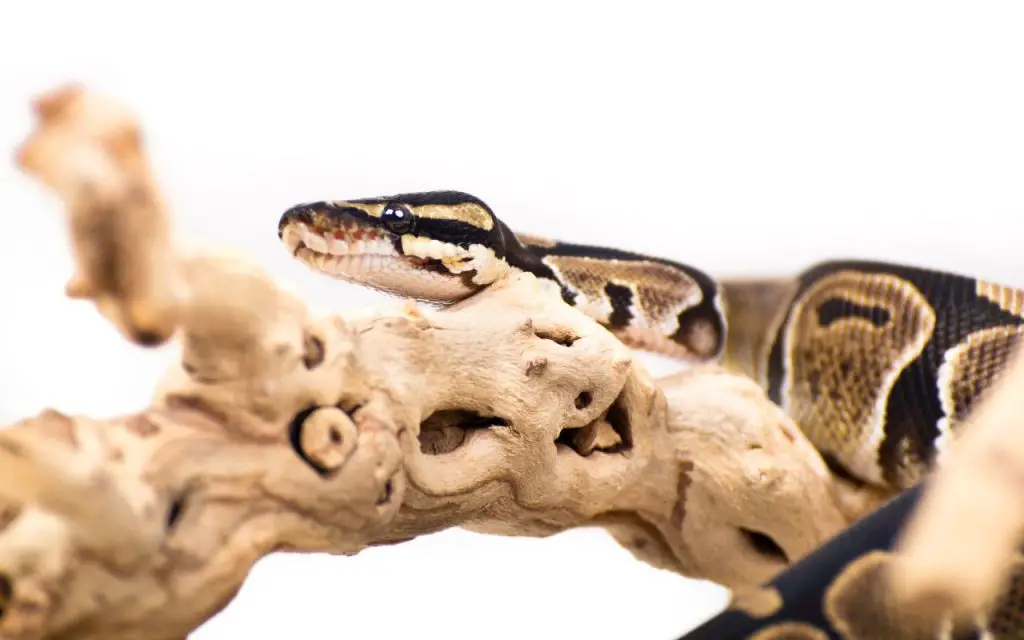
FAQ related to sleep in Ball Pythons
Do ball pythons need light at night?
Ball Pythons do not need any light at night, and might even be annoyed by it. With their elliptical pupils and heat pits, these snakes are perfectly adapted to hunt and explore at night. Whilst they will tolerate some light, avoid having too much on near their enclosure overnight.
Do ball pythons need heat at night?
Ball Pythons do need heat at night. Heat is essential for their digestive system, and the functioning of their immune system. Not providing heat at night could make your snake more susceptible to a range of illnesses.
Do ball pythons curl up to sleep?
Most Ball Pythons curl up a bit to sleep, but not in a complete ball. It’s more of a loosely coiled position. Most also prefer to lay their head flat on their substrate.
Also on this topic:
- Ball Python Scale Rot: How to understand and treat it.
- How often should I clean my Ball Python’s enclosure?
- Ball Python sounds *Includes information on diagnosing Respiratory infections
- How long do Ball Pythons live?
- Can I take my Ball Python outdoors?
- Can I leave my Ball Python alone while on vacation?
For more on Ball Python health in general:
Back to the Ball Python health page
